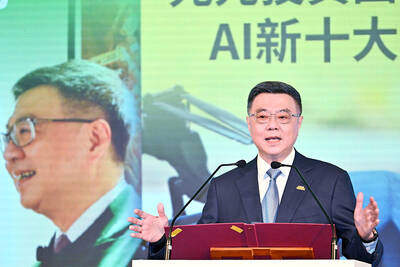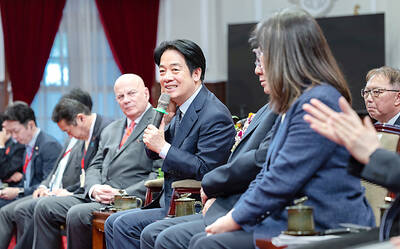The Legislative Yuan yesterday enacted the Road Traffic Safety Basic Act (道路交通安全基本法), finalizing the nation’s new road and traffic policy in hopes of achieving the goal of zero traffic incident-related deaths.
The act, passed by the Executive Yuan on Aug. 17, provides a legal basis upon which traffic safety policies may be enacted and budgets may be allocated.
According to the act, the Executive Yuan has to present a central traffic safety report to coordinate and promote nationwide traffic safety efforts.

Photo: CNA
The premier is to chair a panel of experts consisting of ministers without portfolio, representatives or heads of agencies, and municipal and city mayors, and county commissioners, which is to compile the safety report, it says.
The government is tasked with establishing and enforcing traffic safety regulations, policies and guidelines, as well as conducting regular inspections, publishing reviews and ensuring transparency, it says.
The central government should assist local governments and oversee the policy’s implementation, it says.
Municipal governments and local cities and counties must set local traffic implementation plans and conduct regular assessments of the policies, it says.
Municipal governments, and local city and county administrators should meet with experts, local traffic safety groups and representatives from agencies to review traffic safety regulations, it says.
The central government is tasked with establishing a comprehensive driver training program, and examination and standards of qualifications to become a driver to ensure drivers’ competency, it says.
The central government shall reference international vehicular safety regulations and establish a standard of vehicle safety examination, and ameliorate existing vehicle safety examinations, it says.
Governments across all levels should be transparent about traffic safety information, and work to improve traffic conditions, compile traffic incident data and make traffic safety reports, it says
Chinese Nationalist Party (KMT) lawmakers Lee De-wei (李德維) and Sandy Yu (游毓蘭), and Democratic Progressive Party Legislator Su Chiao-hui(蘇巧慧) said the legislation is a milestone in Taiwan’s traffic safety history.
The country sees more than 3,000 deaths per year caused by traffic incidents, they said, adding that they hope the act would serve to improve traffic safety and to show the international community that Taiwan is no longer a “pedestrian hell.”

Two US House of Representatives committees yesterday condemned China’s attempt to orchestrate a crash involving Vice President Hsiao Bi-khim’s (蕭美琴) car when she visited the Czech Republic last year as vice president-elect. Czech local media in March last year reported that a Chinese diplomat had run a red light while following Hsiao’s car from the airport, and Czech intelligence last week told local media that Chinese diplomats and agents had also planned to stage a demonstrative car collision. Hsiao on Saturday shared a Reuters news report on the incident through her account on social media platform X and wrote: “I

STILL ON THE TABLE: The government is not precluding advanced nuclear power generation if it is proven safer and the nuclear waste issue is solved, the premier said Taiwan is willing to be in step with the world by considering new methods of nuclear energy generation and to discuss alternative approaches to provide more stable power generation and help support industries, Premier Cho Jung-tai (卓榮泰) said yesterday. The government would continue to develop diverse and green energy solutions, which include considering advances in nuclear energy generation, he added. Cho’s remarks echoed President William Lai’s (賴清德) comments in an interview last month, saying the government is not precluding “advanced and newer nuclear power generation” if it is proven to be safer and the issue of nuclear waste is resolved. Lai’s comment had

‘BUILDING PARTNERSHIPS’: The US military’s aim is to continue to make any potential Chinese invasion more difficult than it already is, US General Ronald Clark said The likelihood of China invading Taiwan without contest is “very, very small” because the Taiwan Strait is under constant surveillance by multiple countries, a US general has said. General Ronald Clark, commanding officer of US Army Pacific (USARPAC), the US Army’s largest service component command, made the remarks during a dialogue hosted on Friday by Washington-based think tank the Center for Strategic and International Studies. Asked by the event host what the Chinese military has learned from its US counterpart over the years, Clark said that the first lesson is that the skill and will of US service members are “unmatched.” The second

STANDING TOGETHER: Amid China’s increasingly aggressive activities, nations must join forces in detecting and dealing with incursions, a Taiwanese official said Two senior Philippine officials and one former official yesterday attended the Taiwan International Ocean Forum in Taipei, the first high-level visit since the Philippines in April lifted a ban on such travel to Taiwan. The Ocean Affairs Council hosted the two-day event at the National Taiwan University Hospital International Convention Center. Philippine Navy spokesman Rear Admiral Roy Vincent Trinidad, Coast Guard spokesman Grand Commodore Jay Tarriela and former Philippine Presidential Communications Office assistant secretary Michel del Rosario participated in the forum. More than 100 officials, experts and entrepreneurs from 15 nations participated in the forum, which included discussions on countering China’s hybrid warfare